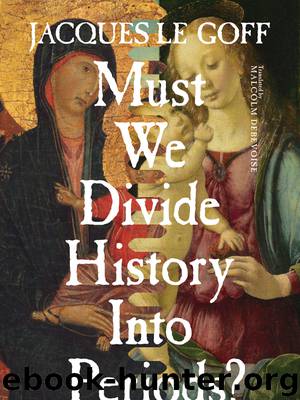Must We Divide History Into Periods? by Le Goff Jacques; DeBevoise Malcolm;

Author:Le Goff, Jacques; DeBevoise, Malcolm;
Language: eng
Format: epub
Tags: HIS054000, History/Social History, HIS016000, History/Historiography
Publisher: Columbia University Press
Published: 2015-09-07T16:00:00+00:00
1492. A glorious year? I have already said that it was indisputably a decisive moment. But its influence on the course of history can be interpreted in different ways, which is why Christopher Columbus’s discovery that year of what was soon to be called America presents the historian with a fascinating case to ponder in relation to the problem of periodization.
The problems this famous date poses have been examined by a great many authors concerned with the Middle Ages and the Renaissance. From an abundant literature I shall briefly consider two books, each by a distinguished historian. The first, Franco Cardini’s Europa 1492, appeared in 1989;17 the second, Bernard Vincent’s 1492: L’année admirable, came out two years later.18
In the late fifteenth century, Cardini observes, the name Europe was commonly used to refer to a political reality. He discusses the relationship of mutual dependence that obtained between the countryside, on the one hand, predominant in respect of both population and area, and towns and cities, on the other, which not only provided consumers of raw materials, particularly foodstuffs, but also a measure of economic protection in years when harvests were poor. The nobility lived luxuriously in its newly demilitarized manor houses, both in town and country. Social classes intermingled—in the public squares of cities in the center and south of Europe, in their grand churches and guildhalls, and on the roads leading north. On festive occasions everyone danced, the nobles in their mansions, the lower classes in the streets. Bath houses, which supplied both hot water and opportunities for sexual pleasure, competed with the churches where people went to pray.
With regard to technology, Europe in the fifteenth century was a playground for inventors. The same thing can be said for painters exploiting new techniques of perspective in painting. Cardini stresses the exceptional role played by Italy as an incubator of innovation and creativity, which extended even to political life with the formation of independent communal regimes in the northern and central regions.
The fifteenth century nevertheless did have another, much darker face. Suffering and hardship were often extreme. Christendom was sorely afflicted by three evils: plague, hunger, and war. This was the age of danses macabres and a grim obsession with the “arts of dying.” But Cardini detects signs of vitality as well, especially the lure of overseas commerce, which since the early Middle Ages had chiefly been concentrated on the spice trade. Dreams of wealth inspired the exploration of the African coasts and, later, the search for an ocean route to the East Indies that finally led Columbus to set sail in 1492. Although many on Columbus’s caravels, and elsewhere in the world from which he came, hoped to discover gold, the Genoese navigator himself was motivated primarily by a desire to lead the pagans toward the true God, the God of the Christians. Columbus was very much a man of the Middle Ages.
Ultimately what Cardini sees at the end of the year 1492, in rendering what he calls an “homage
Download
This site does not store any files on its server. We only index and link to content provided by other sites. Please contact the content providers to delete copyright contents if any and email us, we'll remove relevant links or contents immediately.
| Ancient & Classical | Arthurian Romance |
| Beat Generation | Feminist |
| Gothic & Romantic | LGBT |
| Medieval | Modern |
| Modernism | Postmodernism |
| Renaissance | Shakespeare |
| Surrealism | Victorian |
4 3 2 1: A Novel by Paul Auster(12370)
The handmaid's tale by Margaret Atwood(7752)
Giovanni's Room by James Baldwin(7320)
Asking the Right Questions: A Guide to Critical Thinking by M. Neil Browne & Stuart M. Keeley(5757)
Big Magic: Creative Living Beyond Fear by Elizabeth Gilbert(5753)
Ego Is the Enemy by Ryan Holiday(5412)
The Body: A Guide for Occupants by Bill Bryson(5079)
On Writing A Memoir of the Craft by Stephen King(4927)
Ken Follett - World without end by Ken Follett(4720)
Adulting by Kelly Williams Brown(4564)
Bluets by Maggie Nelson(4546)
Eat That Frog! by Brian Tracy(4522)
Guilty Pleasures by Laurell K Hamilton(4439)
The Poetry of Pablo Neruda by Pablo Neruda(4093)
Alive: The Story of the Andes Survivors by Piers Paul Read(4017)
White Noise - A Novel by Don DeLillo(4001)
Fingerprints of the Gods by Graham Hancock(3991)
The Book of Joy by Dalai Lama(3972)
The Bookshop by Penelope Fitzgerald(3843)
